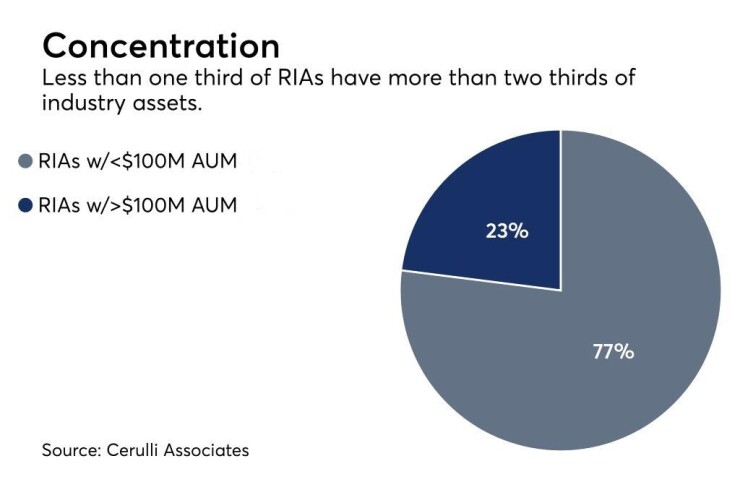The prodigious inflow of outside capital to RIAs is changing the rules of the game for a sector that has, for the past decade, been fiercely independent.
But "the definition of independence is changing," says Scott Slater, vice president of practice management and consulting, Fidelity Clearing & Custody Solutions. "Growth is increasingly being fueled by external capital and firms have more options than ever available to them for how they want to define themselves."
Family offices, sovereign funds, insurance companies, pension funds, private investors and private equity firms are pouring money into advisory firms. HighTower Advisors received
And that's just the high end. M&A consulting and research firm Echelon Partners CEO Dan Seivert estimates there are around 60 private equity firms seeking to make investments in RIAs.
While autonomy is attractive for advisors, firms need to consider how they can be sustainable years from now, Slater warns. "Independence isn't going away," he says, "but it is moving to a more collaborative model."

So, what should advisors who are being approached by outside investors do?
- Make sure there is an alignment of interests.
"You have to find out what the capital partner expects from the investment and what they bring to the table," says Slater, who edited Fidelity's most recent Wealth Management M&A report:
Most capital partners, according to the report, understand the industry, have direct industry knowledge and experience and are willing to invest longer term. They usually select growth-oriented advisory firms that are well run and avoid micro-managing.
These investors should also provide business expertise and networks for sourcing M&A opportunities and "recognize the importance of advisor-client relationships and the need for staff continuity."
- Bring in outside experts before doing a deal.
Private equity firms are highly sophisticated dealmakers, the report cautions. Investment bankers and transitions consultants can "help prepare, guide and increase options for advisory firms to help level the playing field."
Among other things, a third-party expert can hold a competitive auction with suitable capital partners and look at deal/no deal scenarios on an after-tax basis to guide the selection process.
- Insist on a post-deal plan.
Closing the deal is just the beginning of a successful transition, the report notes. Advisors should make sure expectations are set for roles, organizational structure and decision-making processes before a deal closes.
The outside investor should be willing to invest in dedicated onboarding teams, implement best practices and offer paths to partnerships and equity ownership.
- Look for experienced professionals who can help the firm grow.
Private equity firms or outside investors with industry experience who can coach and guide firms, improve business metrics and formulate new strategies "can be very attractive" to potential sellers, Slater says.
- Be well informed about current market trends.
Some advisors may be leery of private equity investments because of that industry's reputation for short-term time frames that emphasize cost cutting and profits in pursuit of a hefty exit strategy payoff.
Looking for a partner with "patient capital" should be a priority, Slater says, but he thinks fears of short-term capital investors can be misplaced.
Private equity's approach to advisory firms has changed, he argues. "It's not just about capturing assets anymore and looking for rapid growth," Slater says. "They understand the business cycle and are interested in engaging and retaining talent as part of a talent acquisition strategy."
To be sure, RIAs should be aware of outside capital's time horizon. They should also make sure outside investors don't try to force advisors to sell products from other companies the investor may own that are not appropriate for the advisor's clients.
As far as pulling the trigger when it comes to accepting outside capital, Slater urges advisors to not just think about their own time horizon but consider what's going on in the broader market.
"There have never been more options for advisors," he says. "Today is as attractive a time as any when it comes to valuations. It's clearly a seller's market."





